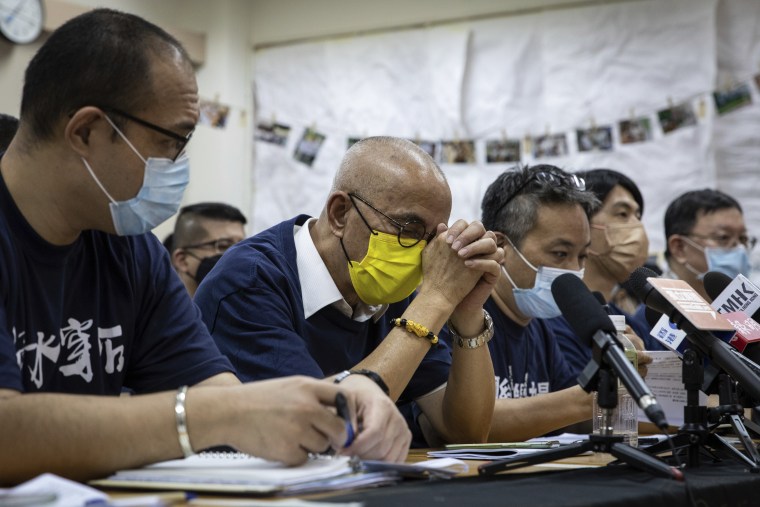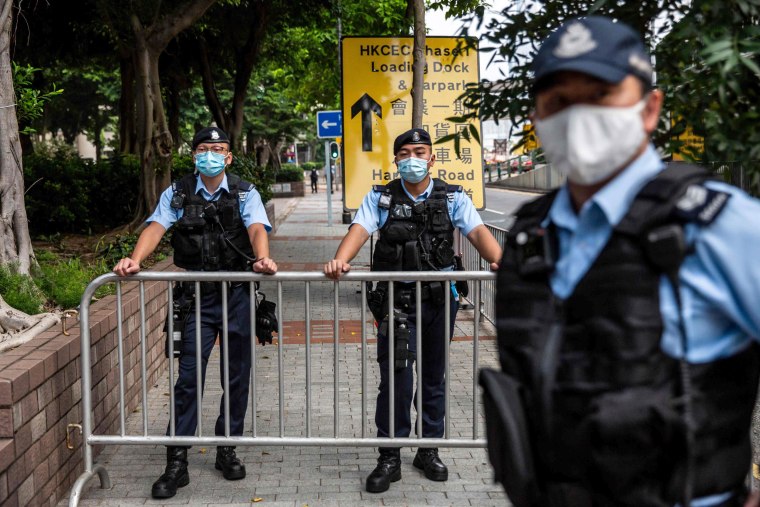HONG KONG — A Hong Kong activist dubbed "Captain America 2.0" for wielding the superhero's shield during protests was found guilty of incitement to secession on Monday, the second person convicted under a national security law imposed by China in a crackdown on dissent.
Former deliveryman Ma Chun-man, 31, was accused of promoting Hong Kong independence from China by chanting slogans, holding up placards and giving media interviews during 20 demonstrations last year.
"Such a clear political stance has undoubtedly made people believe that the defendant had the intention to incite secession," said district court judge Stanley Chan.
"The defendant has constantly and unreservedly incited things that are forbidden under the national security law.”
Ma, who had pleaded not guilty, chose not to testify in court nor summon any witnesses.
Download the NBC News app for breaking news and politics
The national security law was imposed by Beijing in June last year, punishing what China sees as subversion, secession, terrorism and collusion with foreign forces in the former British colony that returned to Chinese rule in 1997.
More than 100 people, including opposition politicians and activists, have been charged under the legislation and are now undergoing legal proceedings that could see some jailed for life.
Critics say authorities have used the security law as a tool of repression, and that the right to free speech, enshrined in the city's mini-constitution, the Basic Law, has been severely undermined.
Ma's conviction was based on things that he said or wrote, rather than any violent act. Hong Kong's first national security conviction involved a man, Tong Ying-kit, who rode a motorcycle into a group of police officers. Tong was sentenced to nine years in jail.
The court was shown videos of Ma chanting "Hong Kong independence, the only way out." A notebook titled "Captain America’s Diary of Resistance" was also seized.
Defense lawyer Edwin Choy told the court earlier that Ma had only wanted to exercise his right to free speech, and that they were merely "empty slogans" and never acted upon.
It wasn’t immediately clear if Ma, who faces a maximum sentence of seven years, will appeal. He will next appear in court on Nov. 11.
Earlier on Monday, international rights group Amnesty International said it would close its Hong Kong offices because the national security law had made it "effectively impossible" for rights groups to work freely without the risk of reprisals.
Anjhula Mya Singh Bais, the chair of Amnesty’s international board, said in a statement that the two offices would close by year-end, noting an intensification of a crackdown that has forced at least 35 groups to disband under the law this year.

"This decision, made with a heavy heart, has been driven by Hong Kong’s national security law, which has made it effectively impossible for human rights organizations in Hong Kong to work freely and without fear of serious reprisals,” Singh Bais said.
"The environment of repression and perpetual uncertainty created by the national security law makes it impossible to know what activities might lead to criminal sanctions," she added.
A Hong Kong Security Bureau spokesman said in response to a Reuters request for comment that "every person or organization must abide by the laws of Hong Kong," and that the security legislation "upholds human rights."
Hong Kong and Chinese authorities have justified the law as necessary to restore stability after mass protests in 2019, when millions took to the streets over many months.
In the past, Hong Kong had served as one of Asia's leading NGO hubs, with groups drawn to the robust rule of law and wide-ranging autonomy that Chinese officials had promised would be preserved. Among the groups to have disbanded this year are several leading trade unions, NGOs and professional groups, while a number of other NGOs have relocated to the democratic island of Taiwan.
